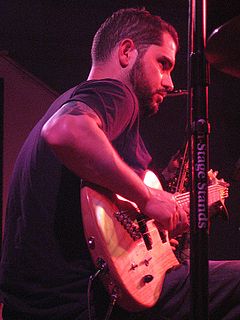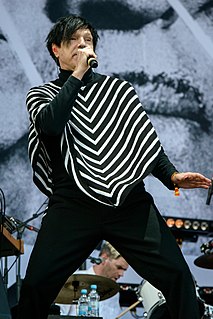A Quote by Jill Talbot
I like to think about the genre, the essay or the memoir, as much as I enjoy writing within its fluid parameters. And teaching allows me to think about it, to articulate it, and to explore it.
Related Quotes
I'm especially interested in what I call practitioner criticism, which is when people who practice an art form start writing about it on blogs. I think that's an immensely important development. I want to see much, much more of that. People who make music who are verbally articulate. And not all musicians are verbally articulate. But those who are should be encouraged to write about what they do and their perception of what other people do. It makes the discourse smarter.
We're living history all the time, in the papers, in the news, you think about stuff and it goes into your brain and you think about it and it comes out somehow. You have an idea; you've heard a phrase, or you're angry, or something disturbs you, or something seems paradoxical to you, you explore that idea, much like a writer would explore maybe an idea through metaphor. Maybe artists use their vehicle to explore ideas, so I think the things that interest me are the kind of idea of continuous change and how nothing stays the same and it's always disintegrating into something more.
I admire Joyce Maynard a lot, specifically her memoir "At Home in the World." Her writing is beautiful and fascinating and seemed to give me validation to the idea that I could write validly in earnest about my life with (my) very feminine point of view, and also that I could unapologetically explore the bad traits of my character (which I find to be more interesting to explore than the good traits), as well as explore other concepts that interest me like private vs public personas, age gap relationships, etc.
I don't think you can take a whole genre of very popular books and say, "This is all trash!" When we read a memoir that isn't by a celebrity, we feel like we're about to go on a journey and we don't know where the journey will lead. But when we read a memoir by a celebrity we feel like we already know the journey and we just want to travel it.
What I think is important about essayists, about the essay as opposed to a lot of personal writing is that the material has to be presented in a processed way. I'm just not interested in writing, "Hey, this is what happened to me today." You get to a place that has very little to do with your personal experience and talks about some larger idea or something in the culture. I don't think you can get to that unless you have had a lot of time to gestate and maybe if I was taking a lot of notes while stuff was going on, I wouldn't be able to get to that place as easily.
But it's hard for me to pinpoint where all my characters and dialogue come from - imagination or real life. My memoir, of course, was all about my past, and many of the short stories cleave very closely to my life, but the more stories I wrote in the collection, the more that seemed to be invented, but who knows... I think I'm writing about a young woman with acne who shoplifts, but I'm really writing about myself.

































